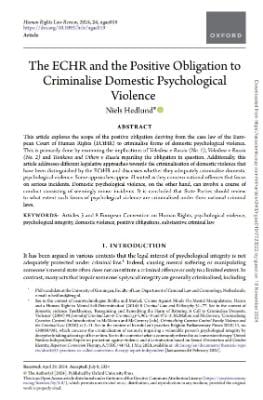
|
The ECHR and the positive obligation to criminalise domestic psychological violence
This article explores the scope of the positive obligation deriving from the case law of the European Court of Human Rights (ECtHR) to criminalise forms of domestic psychological violence. This is primarily done by examining the implications of Volodina v Russia (No. 1), Volodina v Russia (No. 2) and Tunikova and Others v Russia regarding the obligation in question. Additionally, this article addresses different legislative approaches towards the criminalisation of domestic violence that have been distinguished by the ECtHR and discusses whether they adequately criminalise domestic psychological violence. Some approaches appear ill-suited as they concern national offences that focus on serious incidents. Domestic psychological violence, on the other hand, can involve a course of conduct consisting of seemingly minor incidents. It is concluded that State Parties should review to what extent such forms of psychological violence are criminalised under their national criminal laws.
|
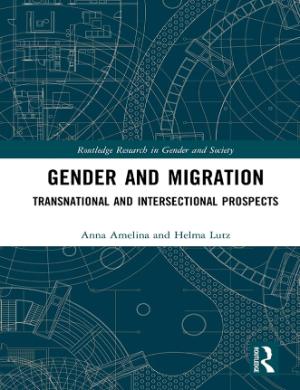
|
Gender and migration: Transnational and intersectional prospects
With its explicit focus on the gendered structures of migration-sending and migration-receiving countries, Gender and Migration builds on the most current conceptual tool of gender studies intersectionality which calls for collective research on gender with analysis of class, ethnicity/race, sexuality, age and other axes of inequality in the context of transnational migration and mobility. The book also includes descriptions of a number of recommended films that illustrate transnational migrant masculinities and femininities within and outside of Europe. A refreshing attempt to bring in considerations of queer theory and sexual identity in the area of gender migration studies, this insightful volume will appeal to students and researchers interested in fields such as sociology, social anthropology, political science, intersectional studies and transnational migration.
|
|
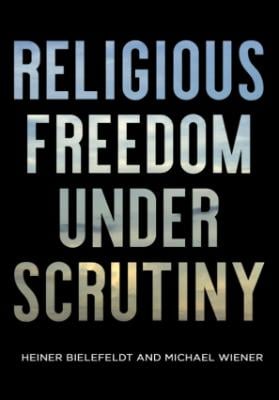
|
Religious freedom under scrutiny
In Religious Freedom Under Scrutiny, Bielefeldt and Wiener explore various critiques leveled at this right. For example, does freedom of religion contribute to the spread of Western neoliberal values to the detriment of religious and cultural diversity? Can religious freedom serve as the entry point for antifeminist agendas within the human rights framework? Drawing on their considerable experience in the field, Bielefeldt and Wiener provide a typological overview and analysis of violations around the world that illustrate the underlying principles as well as the relationship between freedom of religion or belief and other human rights. Religious Freedom Under Scrutiny argues that without freedom of religion or belief, human rights cannot fully address our complex needs, yearnings, and vulnerabilities as human beings. Furthermore, ignoring or marginalizing freedom of religion or belief would weaken the plausibility, attractiveness, and legitimacy of the entire system of human rights.
|
|
|
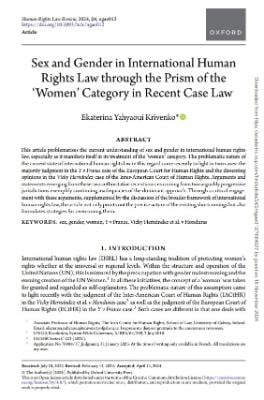
|
Sex and gender in international human rights law through the prism of the ‘women’ category in recent case law
This article problematises the current understanding of sex and gender in international human rights law, especially as it manifests itself in its treatment of the ‘women’ category. The problematic nature of the current state of international human rights law in this regard came recently to light in two cases: the majority judgment in the Y v France case of the European Court for Human Rights and the dissenting opinions in the Vicky Hernández case of the Inter-American Court of Human Rights. Arguments and statements emerging from these two authoritative recent sources coming from two arguably progressive jurisdictions exemplify continuing inadequacies of the dominant approach. Through a critical engagement with these arguments, supplemented by the discussion of the broader framework of international human rights law, the article not only points out the precise nature of the existing shortcomings but also formulates strategies for overcoming them.
|
|
|
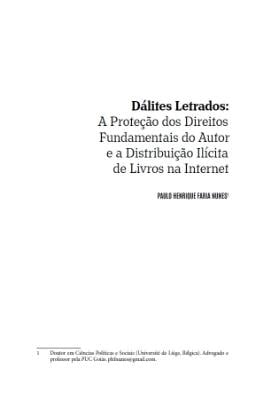
|
Dálites Letrados: A proteção dos direitos fundamentais do autor e a distribuição Ilícita de livros na internet
O direito à propriedade material e intelectual, previsto em normas domésticas e internacionais, integra a categoria “fundamentais” e/ou “humanos”. No entanto, encontra-se grande resistência da sociedade e dos agentes públicos na sua efetiva proteção. A contrafação, prática criminosa, causa prejuízo às empresas e viola o direito fundamental do autor de uma obra. A internet potencializou o impacto da contrafação e levou à falência estúdios, gravadoras e editoras. Este trabalho analisa mais particularmente o mercado literário e o embate “direito fundamental do titular do copyright” versus “pirataria on-line”. No decorrer da pesquisa, de natureza preponderante, mas não exclusivamente, qualitativa e explicativa, o autor empreendeu levantamento bibliográfico e fez incursões ativas no “campo virtual”. Verificaram-se prenúncios de câmbio normativo e do padrão de consumo, mas o cenário ainda não é favorável à aceitação dos direitos fundamentais dos escritores.
|
|
|
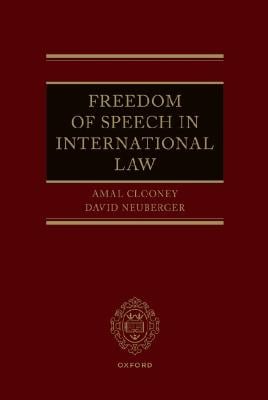
|
Freedom of speech in international law
Freedom of Speech in International Law charts the minimum protections for speech enshrined in international human rights law. It clarifies what the right to freedom of expression means under international law, identifies conflicts between law and state practice, and provides key recommendations as to how international standards should be interpreted, updated, and enforced. Each of the book's six chapters focusses on an area of the law that is being weaponized to silence the press or curtail freedom of expression. Chapters focus on insulting speech (including defamation and sedition laws), false speech (through misinformation or disinformation laws), hate speech, and speech affecting national security (in form of espionage/official secrets laws and terrorism laws). Each chapter outlines relevant state practice, identifies the conflicts that exist in international human rights law, and highlights areas for reform. Examples throughout the book demonstrate the legislative tools relied on by states to quash dissent - not just sedition, treason, and criminal insult laws that have traditionally targeted speech but, increasingly, terrorism, 'false news', and other vague laws to protect themselves against unflattering press. Recommendations at the end of each chapter aim to bridge the gap between practice and the legal obligations of both states and social media companies that have expressed voluntary adherence to the same standards.
|
|
|
|
|